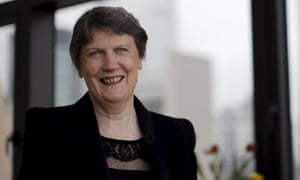
Helen Clark, the former prime minister of New Zealand, has entered the race to succeed Ban Ki-moon as secretary general of the United Nations in a bid to become the first woman in the role of world’s top diplomat.
Clark, who was New Zealand’s prime minister from 1999 to 2008, threw her hat formally into the ring on Monday. Her high-profile entry into the competition is certain to increase pressure among the power brokers of the UN to appoint a woman as the leading face of diplomacy on the global stage.
Announcing her candidacy in New York shortly after she was nominated for the top post by New Zealand’s current prime minister, John Key, in Wellington, Clark said she believed she had the skills to lead the UN as it faced “very serious challenges”.
“The position of secretary general is about giving a voice to 7 billion people who look to the UN for hope and support,” she said.
Clark’s announcement immediately places her as a serious contender to become the eighth secretary general in the UN’s 70-year history. Her reputation as a fighter who survived nine years as premier amid the rough-and-tumble of New Zealand politics is being seen within senior levels of the UN as evidence that she would be able to withstand the pressures of the famously thankless task of leading the world body.
As the head of the UN development programme (UNDP), which she has led for the past seven years, she has proven herself to be a tough administrator who has cut budgets in her area. That may earn her valuable support from the US, which begrudgingly pays the lion’s share of the UN’s running costs.
When asked at the press conference announcing her candidacy whether she would seek to reduce the power of the five permanent members of the UN security council, Clark gave a diplomatic answer. “I acknowledge the importance of the P5, as I acknowledge the importance of every member state,” she said.
Much of the debate around the replacement of Ban is focused on the question: will it break the glass ceiling and see the appointment of the UN’s first female leader? Four out of the eight candidates who have thrown their hat into the ring so far are female, including the Bulgarian Irina Bokova, who heads UNESCO and is seen as Moscow’s favorite for the job.
In December, both the president of the UN general assembly and the president of the security council – the US ambassador Samantha Power – wrote an unprecedentedjoint letter to all member states urging them to nominate female candidates. An Equality Now online campaign calling for a woman to be appointed secretary general has also attracted more than 30,000 supporters.
Announcing her candidacy, Clark stressed that she saw herself as the gender-neutral best person to lead the world body. “I’ve never sought election as a woman,” she said, though she added: “In the normal course of events I would like to see women have a fair chance, an equal chance at every leadership position.”
This may be the first time that the secretary general is chosen with a modicum of transparency. The first seven holders of the post, including Ban, have all been selected through a byzantine system of horse-trading behind closed doors by the five permanent members of the security council – Britain, France, the US, Russia and China.
Ban’s successor will still be decided in effect by the security council that will eventually hand its choice to the UN general assembly for approval. Unlike in previous rounds, however, this time the general assembly – the UN’s world parliament, in which all 193 member states are represented – is determined to do more than act as a rubber stamp.
In what amounts to a quiet insurrection, the general assembly has devised its own process for the appointment of Ban’s replacement. The new approach is the brainchild of the assembly’s current president, the reform-minded Danish politician Mogens Lykketoft, who is determined to drag the selection process out of the shadows and into the full light of public accountability.
Lykketoft has set up a website on which the names and CVs of all eight candidates for the top job have been posted – itself a first. The candidates have each been required to submit a 2,000-word essay pitching themselves for the role, and next week will face a grilling in the Trusteeship Council of the UN in New York.
For over two hours, questions will be fired at them from ambassadors to the member states, as well as from a selection of NGOs, businesses and individuals from outside the organization. In addition, the candidates will take part in two public hustings co-hosted by the Guardian, the first in New York on 13 April and the second in London on 3 June.
“This is a leap forward in terms of transparency. For the first time in history, the process is being brought into the open,” said Dan Thomas, spokesman for the president of the general assembly.
[Source:- The Guardian]





